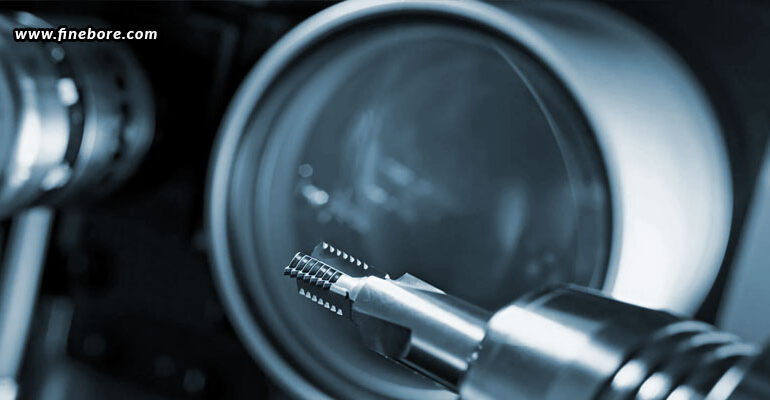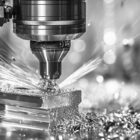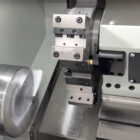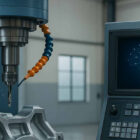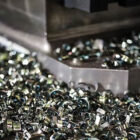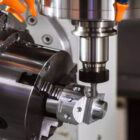Precision boring is essential to modern manufacturing as it ensures flawless surface finishes and precise tolerances. This procedure is essential for industries including electronics, medical devices, automobiles, and aerospace where precision down to a few microns is unavoidable. This blog explores the methods that make precision boring possible, the equipment made specifically for these kinds of jobs, and the industries that rely on them.
Techniques for achieving micron-level accuracy
Combining advanced techniques with careful execution is necessary to achieve precision in boring. To guarantee the highest levels of accuracy, the following guidelines are crucial.
- Tool selection and adjustments: When it comes to precision boring, tool selection is crucial. The strength and endurance required for micron-level accuracy are provided by high-quality boring heads and bars, ideally with carbide or cubic boron nitride (CBN) tips. To ensure uniformity, tools should be examined for wear or damage prior to each usage. Additionally, in order to attain precise dimensions, precision boring requires tools that provide micro-adjustments. Fine-tuning mechanisms are built into tools like modular boring bars and boring heads. For example, machinists can make accurate adjustments down to the micron level with digital displays or modifications similar to those found in micrometres on digital boring heads. On the other hand, modular systems with customizable setups and interchangeable components ensure adaptability and repeatability.
- Accurate setup and alignment: To avoid tapering or off-centre holes, the boring tool must be properly aligned. Off-centre holes, ovality, or tapering can result from misalignment. To guarantee that the tool is precisely aligned with the workpiece, advanced alignment systems such as dial indications, optical centring devices, or laser-guided setups are crucial. Advanced laser alignment systems increase alignment precision for crucial applications, and dial indicators guarantee that the boring bar is precisely centred in the spindle.
- Controlled cutting conditions: To avoid mistakes brought on by vibrations, thermal expansion, or tool deflection, ideal cutting conditions must be maintained. For finishing passes to guarantee a smooth, accurate cut, slow and steady cutting speeds and feed rates are chosen as they help minimize heat buildup and limit tool deflection, both of which are essential for achieving tight tolerances. Chatter is avoided and the machining process is stabilized by employing tuned boring bars or damping devices for effective vibration control. High-performance cutting fluids or cooling systems are also essential for reducing heat and friction, which improves dimensional accuracy and prolongs tool life.
- Single-point cutting and multi-step processes: It is better to use single-point boring tools for precise work. By removing material in controlled amounts, these tools lessen the chance of overcutting and help create a clean surface. Unmatched control over dimensions is possible with CNC machines that have single-point tools. It frequently takes several passes to achieve micron-level accuracy, starting with rough boring to swiftly remove the majority of material and get the hole ready for further steps. Superfinishing is used when an extraordinarily smooth surface is needed, while finishing passes concentrate on achieving the exact measurements and desired surface quality.
- Real-time monitoring: In order to provide operators with real-time feedback that allows them to make adjustments and maintain accuracy throughout the process, modern precision boring systems use sensors to monitor vital parameters like temperature, vibration, and tool wear. Rough boring is often the first step in achieving exact results as it removes the majority of the material and establishes basic dimensions. To fine-tune the measurements and get the surface ready for the last step, semi-finishing is the next step. The last pass, finishing, guarantees the required surface quality and accuracy, frequently with increments of only a few microns.
Manufacturers can attain the high levels of precision needed for crucial applications across industries by combining these strategies and utilizing cutting-edge technologies.
Tools that enable precision boring
Specialized tools made to satisfy the exacting specifications of high-accuracy machining are necessary for precision boring, some of the most important ones being –
- Boring heads: Digital boring heads ensure maximum accuracy throughout operations by facilitating simple and accurate adjustments with real-time readouts. Because of their remarkable rigidity and adaptability, fine-boring heads are perfect for finishing operations and are essential for reaching precise tolerances.
- Boring bars: By preserving stability, tuned boring bars made of vibration-dampening materials perform exceptionally well in deep-hole boring. Because of their exceptional resistance to wear, carbide and CBN pointed bars are very useful for cutting hard materials.
- CNC machines: CNC machines with precision boring tools guarantee automated, repeatable processes while continuously upholding standards at the micron level. In crucial applications, these technologies improve accuracy and efficiency by drastically lowering the possibility of human error.
- Modular tooling systems: Unmatched flexibility is provided by modular tooling systems, which enable machinists to customize tools to meet particular needs. These systems are perfect for a variety of boring applications because they allow customization without compromising accuracy.
- Inspection tools: Coordinate measuring machines (CMMs) are used to examine bored holes, confirming dimensions and surface finishes to guarantee maximum precision, while bore gauges provide accurate measurements of internal diameters.
It takes advanced technology, precise methods, and careful examinations to achieve micron-level accuracy in boring. Manufacturers satisfy the exacting requirements of contemporary industries by ensuring precision through the use of digital heads, tuned bars, CNC systems, and modular equipment.
Industries requiring micron-level accuracy
In industries where failure to satisfy tolerances might have disastrous repercussions, precision boring is essential. The following industries rely significantly on this process –
- Aerospace: To guarantee dependability and safety, components like engine casings, landing gear pieces, and turbine housings need to be extremely precise. Precise boring guarantees that these components fulfil precise requirements.
- Automotive: Boring guarantees that cylinders and other parts fit precisely during engine production, enhancing performance and efficiency. Crankshafts, valve guides, and fuel injectors all require precision down to the micron level.
- Medical: To guarantee compatibility and functionality, precision boring is required for surgical equipment and medical implants. Orthopaedic implants, such as hip joints, and dental implants, for instance, need precise measurements and immaculate finishes.
- Electronics: As electronics get smaller, precise boring is required for connectors, enclosures, and heat sinks. Frequently, the tolerances fall below the micron range.
- Oil and gas: For long-lasting and leak-proof performance, precision boring is advantageous for large parts like pumps and valves used in the oil and gas sector.
As you can see, precision boring is an essential process for industries requiring extreme accuracy and flawless surface finishes. It is impossible to overestimate the significance of precision boring in anything from medical equipment to aircraft. The potential for reaching ever-higher levels of precision and efficiency keeps growing as technology advances, pushing the limits of contemporary manufacturing. Businesses that are essential to the advancement of this industry include FineTech Toolings, which is well-known for high-quality precision boring tools in Bangalore. FineTech Toolings provides a selection of long-lasting, premium precision boring tools that are made to the highest industry standards, with expert and innovative solutions helping manufacturers attain unparalleled accuracy and consistency in crucial applications, further expanding the possibilities of contemporary machining.

